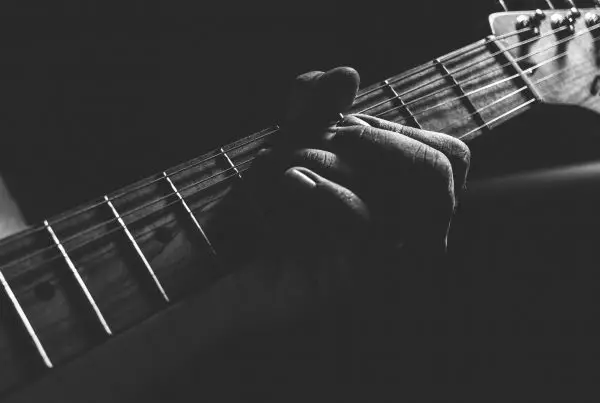Amp hissing sounds can be caused due to high volume settings. Whereas an amp buzzing sound can occur due to heavy usage and faulty components.
Guitar amp buzz can happen at any time and the amount varies heavily depending on the design and the amp’s sound.
Note that healthy amps can also make some noise when idle – so it doesn’t necessarily mean that your amp is broken. It depends on how bad and how often the amp buzzes.
It’s very annoying when the beautiful audio playing through the speakers starts crackling. It can turn a mesmerizing auditory experience into a difficult time.
I’ve had several people ask me about guitar amp buzz & pops, so I decided to write this article to explain this in detail. I have had this amp buzz issue for many times now!
In this article I will discuss amp buzz in detail and ways to fix it. Here are the topics we will cover in this article:
- Why Is My Amp Making Static?
- How Do I Fix Amp Buzz?
- What Else Can I Do?
- Amp Buzzing With Nothing Plugged
- Why Does My Guitar Amp Pop When I Turn It On?
Also Read: Complete Guide To Stop EVERY Type Of Buzzing Noises For Amp!
Why Is My Amp Making Buzzing Static Noises?
An amp can make buzzing static noises due to reasons like a faulty connection, dirty jacks, weak power cords, or even broken solder connections in the circuit.
Various factors can contribute to amp buzzing. Check for a few things. Does the sound cut out when you play high notes? Is it when you turn the volume up or down? Or does bass cause that noise?
Finding the cause of the static noise is vital when trying to fix it. Once you find the cause of the static noise, it should be pretty easy to fix it. Let’s go through in more detail how to fix this annoying buzz from your amp.
6 Reasons & Fixes To Buzzing Amp
To fix amp buzz, you first need to find the root cause. Sometimes, the problem isn’t with your amp. It could be one with your guitar or even your cables. Here are 6 things you could do to fix amp buzz.
1. Replug Guitar and Amp Cables
You can fix a buzzing guitar amp by replugging the connection jack in your guitar and amp. Often, there is a loose connection with the audio jack, which can cause distortion in the amp’s sound.
Check whether your guitar works properly or not before checking the amp. Often, a faulty connection between the guitar and the amp can cause a lot of distortion in the sound.
If you have another guitar, try plugging it into the amp and see if the problem stays, you can take your amp to a guitar shop and try on different guitars there.
If other guitars work fine, but yours doesn’t, this is a good indicator that there’s a problem within your guitar and not the amp.
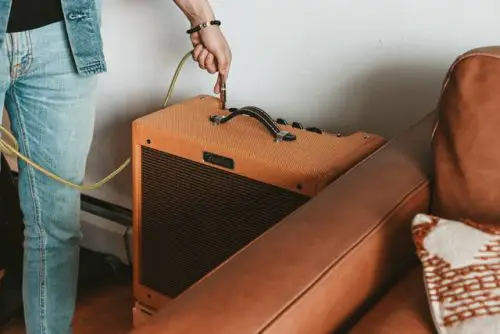
Replug your amp cables if you hear buzzing and static noises.
2. Replace the Cables
Cables can have several faults that can develop over time. A bent cable can cause static, and a bare wire will worsen it. A simple, inexpensive cable replacement could make guitar buzzing vanish quickly.
If you have another cable lying around, just switch it and check if it helps to check if your cable is the cause of buzzing.
There’s another way to check, plug the jack in the amp and press your thumb on the other end. You should hear a buzz in the sound but not a crackle. The crackling sound means that the wire has a problem.
The final thing to do here is pressing your thumb on the connector jack while it’s connected. There shouldn’t be any difference in sound, but if there is, that indicates a defective cable or guitar jack.
When buying cables, make sure you go for sturdier, thicker cables with good connector jacks that won’t bend or break easily.
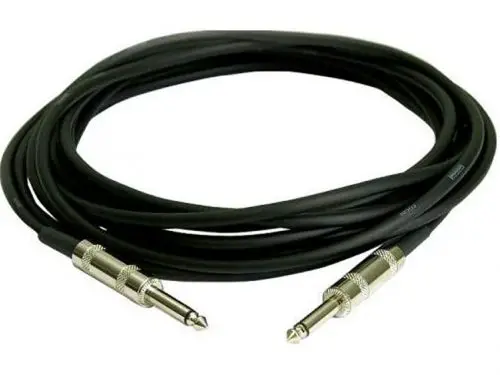
Replacing amp cable is the most common way to fix buzzing amp issue. You can get a replacement for $10 on Amazon.
3. Check the Power Cord
Bad power cords can cause amps to buzz because there’s not enough electric supply.
Check out the cable you’re using, and make sure to use thicker cables that provide enough power to your amp.
Cables have to go through many wear and tear, so it’s natural for them to go bad after a while. There are usually two things that can happen to your power cables: either the power cable has gone bad, or the connector has. Either way, you will need to change the power cord to check for a difference.
Check for a bad cable before you get a new one by wiggling it while it’s plugged in and your guitar is connected to the amp. This is the same trick we used to check for the connector in the guitar.
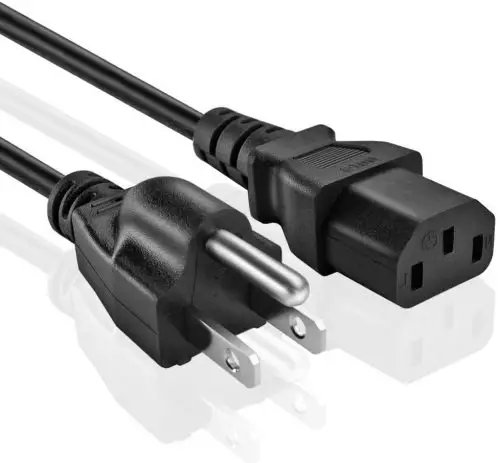
If the amp cable is working fine – then the power cable is the next common thing that causes amp buzz.
4. Clean out the Audio Jacks
Dirty input jacks can cause a lot of amp static noise when playing. Clean them by spraying a cleaner onto a cotton swab.
Insert the swab inside and rotate it a few times. Repeat this process till it’s cleaned from the inside. Let it dry for an hour before plugging everything back in.
Guitar jacks are one thing, but commonly amp jacks could also be a problem. Due to dust accumulated inside the jack. Giving them a proper cleaning can ensure better performance from them.
The easy way to clean the jacks is to put a few drops of rubbing alcohol on a Q-tip, put them into the amp jacks, and rotate them.
Once you get the Q-tip out, you should see a lot of dirt accumulated on it. Once done cleaning, wait for an hour or two before you plug in your electric guitar. If you notice a better sound, then those dirty jacks were the cause of the humming or cut-out.
5. Clean the Pots in the Amp
Dust and grime build up on your guitar pots can cause a lot of unwanted static noise through the amp.
Clean them using an electric contact cleaner and move the knobs around to make sure they have been thoroughly cleaned.
The pots on your amp and the guitar can cause sound to cut out, primarily when not used for more extended periods. There are a lot of factors that can contribute to a non-optimal sound, like improper tuning or dirt and grime buildup.
When you turn the knobs, your problem likely lies in the pots if you hear the distortion. Cleaning them is very simple, and you only need to use an electric contact cleaner for this.
Use something like WD40 for this as it removes any dust, oil, and unwanted residues from surfaces of sensitive electronics.
You need to disassemble the amp for this, but you can easily find a tutorial for your specific amp on YouTube.
6. Resolder the Connections
Broken solders on circuits can also be the factor in causing amp humming or the sound being cut out.
Wires can disconnect or become loose and cause distortion in the sound or even cause it to completely cut out. Use a soldering iron to resolder the loose connections.
If the tips I mentioned before don’t work, this is likely the culprit here. Solders can break due to many reasons, like changes in temperature, humidity, and physical damage.
You will need a few professional tools like a soldering iron and a solder sucker. If you’re not experienced in these repairs, I’d strongly suggest you avoid them as they can mess everything up.
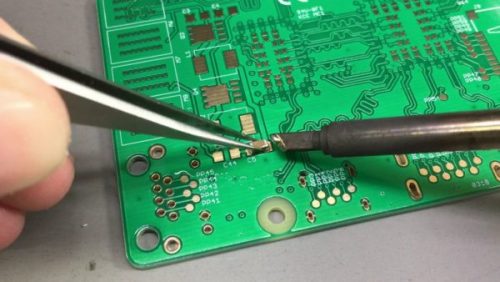
It’s possible to fix amp buzz by soldering the circuit. However, this should only be done by a professional.
What Else Can I Do To Fix Amp Buzz?
There isn’t much else you can do to fix your guitar amp at home. However, you can plug in your amp in different power outlets.
If that doesn’t work, try changing the rooms. Try playing in different positions and areas to see if it affects the sound through the amp.
If nothing works, you should get your amp checked out by a professional because it is likely a more technical issue.
Do not tamper with the electrical equipment unless you’re a professional. Remember, safety first!
Why Is My Amp Buzzing When Nothing Is Plugged In
A buzzing amp when nothing is plugged in could be caused by a loose solder connection.
If an amp is humming, then it could be caused by loose earthing connections. Most likely, it could be a loose wire strand making contact with the center that causes the hum.
You should check for how long the buzzing lasts after everything is unplugged. If the buzzing stops quickly, then your amp is fine.
If your amp retains charge after unplugging and stays buzzing, then your amp is faulty and should be fixed by an electrician.
Another way you can check for the problem is by trying different electrical outlets, preferably ones without any other connections such as lights or a dimmer switch.
Why Does My Guitar Amp Pop When I Turn It On / Off?
Guitar amp pops when you turn it on (or off) because high voltage energy is released from the power supply every time you power up (or down) the amp.
These surges in power can produce a pop noise as they release energy. It’s always a possibility that these surges will produce a pop noise.
The underlying problem is the misuse of this switch. It shouldn’t be used as a “Mute” button for your amp. These switches are made to protect the capacitors in the amp.
Most technicians have suggested that there is no harm in using these switches. It is detrimental to tube amps’ health as the tubes can suffer from cathode poisoning. This is when the tubes are left on standby with no voltage, making them very hot.
Conclusion
Guitar amps can suffer from buzzing, and it’s a very common phenomenon. Fixing it can require a bit of patience and testing. If nothing works, you can always let the professionals handle it.
Make sure to keep your amps clean from dust every now and ten and turn them off completely rather than putting them on standby when not using them.
I hope this article helped you understand what guitar buzz is, why it happens and how to fix it.



